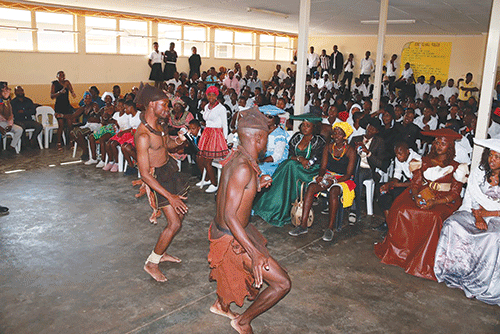OPUWO – Learners at the Mureti Senior Secondary School in Opuwo are advising fellow Namibian peers to respect culture as it forms an integral part of a person’s identity and not be overwhelmed by Western ideologies.
At Sanlam Namibia’s sixth edition of the ‘My Culture, My Life’ tour in Opuwo, a 10th grader, Kukariuaije Ngumbi told Youth Corner he has noticed young Namibians from the regions, seeking greener pastures to cities like Windhoek.
He said upon completion of studies or getting good jobs, they hardly return to where they come from.
The sixth edition of the ‘My Culture, My Life’ tour, this time – targets the Kunene region. “ I feel it is crucial and important for young Namibians to respect the culture, and know the significance of identity, and that means sticking by their parents, or their elders and learning as much as they can from them instead of abandoning them,” said the 19-year-old. Ngumbi, who aspires to be a geologist intends on going to Windhoek once he completes his matric, and seek admission at the University of Namibia.
“There is a need to balance things in life. We need to be educated, need to evolve. We need to pay attention to growth, but it is equally important for us to preserve our culture and to know where we come from as human beings, especially people from this part of the country,” he stated.
Aimed at creating awareness of the significance of culture around the country, the Corporate Social Responsibility programme is an initiative aimed at promoting and preserving the diverse Namibian culture, among the youth in particularly school learners.
The team has been to Zambezi, Kavango, Erongo, Omusati, Hardap, //Kharas. Additionally, the Sanlam Namibia team requests the presence of local artists, preferably from the area they pick to be entertainers and educators for these engagements.
Ngumbi’s classmate Ngaimbirahiue Muhuka expanded on his peer’s statement, adding that people from the region are not likely to be academically exposed so it is important for those who are educated to come back to the area and educate others.
“I am fully aware of the influence that city life can have on a person, especially when it comes to forgetting or not being culturally inclined to do things. So when I get a chance to be in the city, I will still make sure that I take part in cultural activities so that I can preserve the culture and also keep in touch with my identity,” said the denarian.
Muhuka added: “Even if you are in the city, you can still wear your traditional attire for example walk around the city confidently, the people you find there will know about your roots. I’m capable of doing that because I am proud of where I come from. Just because you are in the city of lights in all these parks, it doesn’t necessarily mean you need to neglect your culture.”
He is disappointed with some of his peers who go to urban areas and immediately start feeling ‘embarrassed’ about where they come from. “For example, as you have seen today even right here in a pool, we are having a cultural day and were requested to wear our traditional attire, yet the majority of my fellow learners didn’t wear their attire. This is an indication that they are deviating from the norm and it’s giving me a sense of embarrassment that they are not wearing the traditional attire – probably due to Western influence or other aspects,” he pondered.
School principal Petrus Angala said the culture in school is an important entity as it constantly reminds learners of the importance of diversity and appreciation for one another.
“We are very unique because we have learners from different backgrounds, so our culture is quite diverse and you try to accommodate everyone, irrespective of where they come from,” said Angala.
To inculcate national pride and the importance of culture, he said the school has cultural groups and this is evident, as the school has participated in various cultural activities, where they have walked away with a lot of accolades.
Angala noted one of the biggest obstacles in learners, which limits their commitment and performing the cultural dances or activities is the lack of attire to complement this activity, which can kill their morale.
Education inspector in the Epupa circuit Joshua Shikongo said culture is vital as it can keep one grounded instead of running around like headless chickens.
“You have people fighting for ideologies and people want the minority to align with theirs. Our children are heavily influenced by television and outsiders. In culture, we have good practices and bad ones and those need to be discouraged,” stated Shikongo.
psiririka@nepc.com.na


